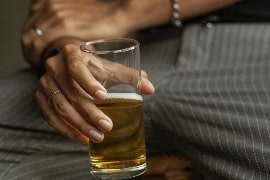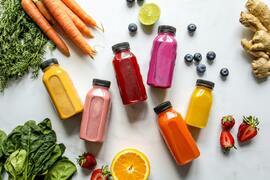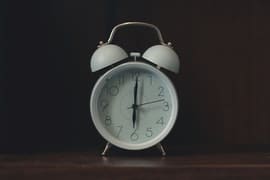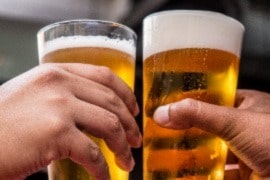When you begin a life in recovery, you may not know how to relax without alcohol. Fortunately, there are many effective relaxation techniques that don’t involve drinking.
Bill “Spruke” Boulden is an engineer and musician from Buffalo, NY. Following his recovery from addiction, Bill decided to blog about his experiences and share what he’d learned with The Recovery Village.
I spent nearly a decade under the sway of alcohol addiction, and towards the end of my relationship with it, I thought I “needed” it to unwind in the evening. Of all the stages of my recovery — immediate detox, forming new habits, embracing a new life and maintaining sobriety — the step I remember most vividly is discovering new ways to spend my evenings.
Here are four tips I have learned to help you face evenings without alcohol.
1. Prepare ahead of time for challenging evenings.
If relearning how to live life without alcohol was easy, we’d have done it already. The fact is, there will be nights you struggle with unease and discomfort. The following are common in individuals newly learning how to spend evenings alcohol-free:
- Anxiety and/or depression
- Boredom
- Difficulty falling asleep
- Feeling excluded from nightlife activities that revolved around drinking
An added trap is the phenomenon of the “pink cloud.” Medical researchers describe this as the period that occurs in early recovery when a person experiences euphoria and has difficulty understanding the reality that recovery can be difficult. During this time, the brain and spirit, freshly freed from the depressive effects of alcohol, feel excited about life again. Because the pink cloud is a temporary phase, it can set up a false expectation for the recovering individual that life will be permanently blissful. This belief secretly blindsides them to the challenges they might face when they do find themselves bored or depressed one night, and therefore increases the risk of relapse.
It’s important to set up coping mechanisms now so that if you encounter these relapse triggers in the future, you aren’t tempted to return to drinking. An anxious or depressed mind is more vulnerable to relapse than a happy mind is, so plan ahead on good days for challenging evenings.
Here are a few examples of how others have coped with triggers in specific situations:
- “It was really fulfilling and satisfying cooking this nicer-than-usual dinner for myself. I’ll make a note of how good this felt, and if I feel anxious later this week, maybe I’ll try this again to keep my hands busy.”
- “There are a lot of meetings on my agenda at work tomorrow, some with people who can get under my skin. That might put me in a bad mood as I head home and is the type of scenario I’d used to drink after. I’m going to make plans with a friend to see a movie and buy the tickets now so I’ll have something else to look forward to.”
- “I’m thinking ahead to Saturday’s birthday party for my mother. I know my uncles will be there, and they often pressure me to drink. I should practice my responses now so I’m not coming up with it on the spot.”
2. Accept small amounts of discomfort as “work worth doing.”
Often, we turn to alcohol out of “experiential avoidance.” It’s the desire to avoid our experiences as they are being presented to us, and instead modify or replace or ignore them. This is often born from emotions like fear, loneliness or an unwillingness to accept challenges or conflict in your life or self. The alternative to avoiding one’s experiences is mindfulness: the willingness to be present for one’s experiences as they present themselves without struggling to alter them, accepting the soothing and uncomfortable alike.
A review of academic literature on mindfulness found across the board that groups practicing recovery that include mindfulness-based exercises experience significantly greater freedom from cravings than groups that do not include such exercises. These exercises include meditations, quiet walks, moments of reflection and continued awareness of the moment you are living in.
Ask yourself: “Isn’t it okay to feel less than great right now? Must I feel good all of the time?”
Many things that are worth doing involve pain and discomfort, such as:
- Sweating through discomfort when working out for the good of your body
- Dealing with the confused and awkward phase of learning a new language
- Getting frustrated when practicing an instrument and you can’t do a part right, but the practice is how you get better
Recovery is also a period where I accept feeling uncomfortable today for greater things tomorrow. Enduring a period of discomfort and allowing yourself to feel bad is work worth doing, just like a workout or difficult lesson.
3. Rediscover what you loved before alcohol.
Recovery is the perfect chance to fall back in love with the hobbies you set aside when drinking became more important than them. There are more hobbies in the world than I can list, so I will share some that worked for me. Perhaps they will inspire you or remind you of things you can rediscover.
- Competitive Sports. I used to play racquetball. I stopped because I usually began drinking immediately after work and didn’t want to stop to attend my league match. Once I was sober, I rejoined the league and, as a nice perk, found my body performing a little better every week that I put between myself and my addiction. Of course, there was a bit of a rude awakening at first as I came to understand just how much damage I had done by being sedentary and putting on extra weight, but that faded over time.
- Note that some competitive sports such as bar league softball or volleyball might have a social drinking component, so watch out for these.
- Gaming. I had set aside my long-time loves, “Magic: The Gathering” and competitive “StarCraft II.” I didn’t care to stay sober enough to play them competitively. It was more important to me to keep a buzz going than to make wise and accurate plays that kept me moving up the ranks. I rediscovered both these games shortly after recovery and went on to attend every Friday Night Magic for months. I eventually got a tattoo of it across my chest as a reminder of how fundamental it was to my recovery.
- Creative Pursuits. For me, it was DJing. Another recovering friend of mine learned how to play guitar, and yet another paints. Hobbies like these can be excellent artistic avenues for telling your story and sharing any pain or shame you might feel from your addicted days.
4. Try three other things to drink.
There are several alternatives to alcohol if you are looking for something refreshing to drink. Try one of these beverages the next time you want something fun to drink.
- Tea. Throughout the time I was drinking heavily, I thought tea was flavorless and weak. What I didn’t realize was that the continual infusion of tongue-scorching, harsh liquors was destroying my palate so that I could not enjoy the subtle notes of tea. This experience is not uncommon, as research has shown that excessive alcohol consumption interferes with the sense of taste and lowers the pleasure associated with food. Once I stopped drinking and my ability to discern minor flavors returned, I understood what I had been missing. Being unable to appreciate the charm of a good tea because I was too busy drinking whiskey was like being unable to feel being tickled by a feather because I was used to being hit by a sledgehammer. Now, I drink tea every night.
- Decaf coffee: It’s the same charming substance that gets us up in the mornings but with no caffeine, so you can still fall asleep. Do keep in mind that even decaf coffee can contain small amounts of caffeine, so if you’re sensitive to this substance, you would be better off trying other options.
- A premium soda, such as a Jones or Virgil’s: When I stopped drinking, I realized after some time that there was a particular hole in my mind that wasn’t being filled: the idea of a nice, premium beverage. Tea and decaf coffee were all good, but I had gotten used to the idea from my drinking days that some occasions just called for a real fancy beverage, something that costs more than a few dollars and stands out and says, “You’re drinking something special.” These premium sodas help hit that nail on the head. They’re a bit pricey, which keeps them for special occasions only, but that helps make them feel like a minor celebration, which is exactly the role I needed them to fill.
Articles Related to Alcoholism

Alcohol detox isn’t easy and not everyone can do it on their own. That is why alcohol detox and alcohol withdrawal treatment is administered by medical professionals.

Alcoholism takes many forms, and the stereotype doesn’t always hold true. So when do a few drinks with friends become a full-blown alcohol addiction? How do you know if you are an alcoholic?

While cirrhosis scars from excessive drinking are irreversible, quitting alcohol and leading a healthier lifestyle can help your liver heal from alcohol-related liver disease.

When detoxing, hydration is key. However, certain food groups also have benefits when it comes to helping with the discomfort of withdrawal symptoms and detoxification.

Detox from alcohol can begin within hours. Typically, alcohol withdrawal symptoms happen for heavier drinkers. Alcohol withdrawal can begin within hours of ending a drinking session.

Daily drinking can have serious consequences for a person’s health, both in the short- and long-term. Many of the effects of drinking every day can be reversed through early intervention.


10 Ways To Help Someone Stop Drinking
Li, Wen; Howard, Matthew; Garland, Eric; McGovern, Patricia; Lazar, Michael. “Mindfulness treatment for substance misu[…]ew and meta-analysis.” Journal of Substance Abuse Treatment, April 2017. Accessed February 1, 2022.
Galinato, Jan Igor T., and Veloso, Karen R. “Pink Cloud Syndrome Among Ruled Drug Use[…]tion Center (ICDTRC).” Journal of Nursing and Health Care, May 2019. Accessed February 1, 2022.
Forsyth, John P.; Parker, Jefferson D.; Finlay, Carlos G. “Anxiety sensitivity, controllability, an[…]nce-abusing veterans.” Addictive Behaviors, July 2003. Accessed February 1, 2022.
Agarwal, Khushbu; et al. “Taste and Smell Alterations and Substance Use Disorders.” Sensory Science and Chronic Diseases, January 1, 2022. Accessed February 1, 2022.
The Recovery Village aims to improve the quality of life for people struggling with substance use or mental health disorder with fact-based content about the nature of behavioral health conditions, treatment options and their related outcomes. We publish material that is researched, cited, edited and reviewed by licensed medical professionals. The information we provide is not intended to be a substitute for professional medical advice, diagnosis or treatment. It should not be used in place of the advice of your physician or other qualified healthcare providers.